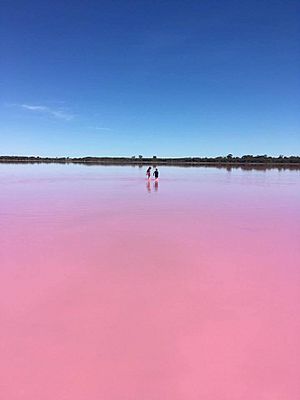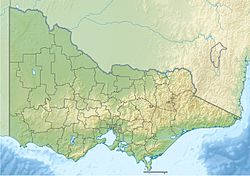Pink Lake (Victoria) facts for kids
Quick facts for kids Pink Lake |
|
|---|---|

Pink Lake, 2015
|
|
| Location | Dimboola, Victoria |
| Coordinates | 36°25′05″S 141°57′40″E / 36.41806°S 141.96111°E |
| Type | Salt lake |
| Basin countries | Australia |
| Max. length | 2 km (1 mi) |
| Max. width | 2 km (1 mi) |
| Surface area | 45 ha (111 acres) |
| Surface elevation | 250 m (820 ft) |
Pink Lake (also known as Lake Lochiel) is a unique, circular, salty pink lake. You can find it just north of Dimboola, Australia, right by the Western Highway.
In 1836, an explorer named Granville Stapylton, who was part of Thomas Mitchell's team, explored this area. He first discovered Pink Lake on July 20, 1836.
Why Pink Lake is Pink
The lake gets its name from its amazing pink color. How bright the pink is depends on how much rain has fallen. More rain can make the color change.
For a long time, people thought tiny red algae made the lake pink. But new studies, shared by Australian Geographic, show something different. The pink color actually comes from a special pigment. This pigment is made by a type of bacteria called Salinibacter ruber.
There is a rest stop where you can stop and look out over the lake. It's a great spot to see the unique pink water.
Harvesting Salt from Pink Lake
People have been collecting salt from Pink Lake since the 1860s. Today, the Mount Zero Olives company harvests about 20 tonnes of salt each year. They work together with the Barengi Gadjin Land Council. This council represents the traditional owners of the land.
Commercial salt harvesting stopped in the 1970s. However, it started again in 2009. This happened after talks between the Victorian State government, the Barengi Gadjin Land Council, and the Mount Zero Olives Company.
See also
 | Janet Taylor Pickett |
 | Synthia Saint James |
 | Howardena Pindell |
 | Faith Ringgold |


